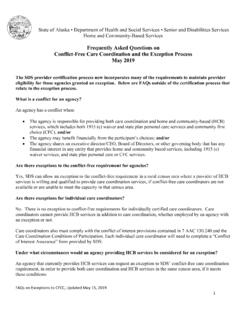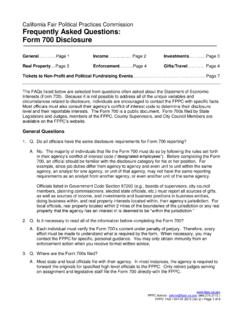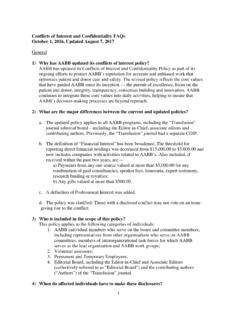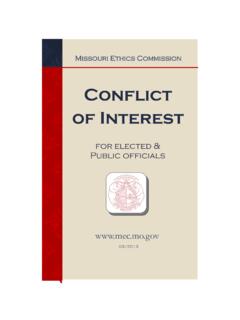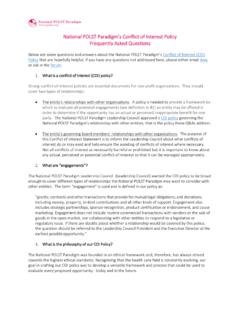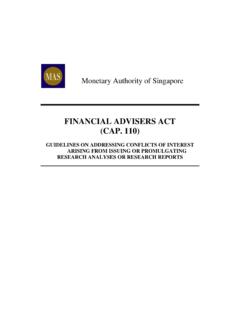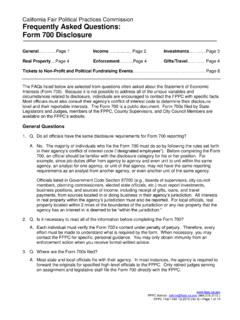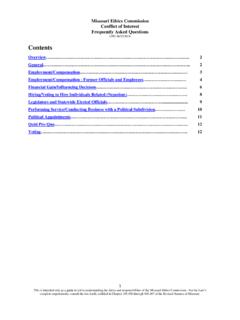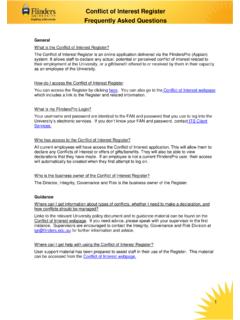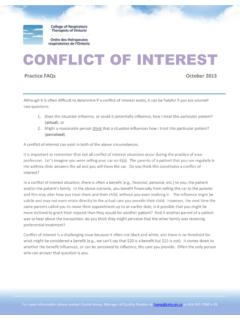Transcription of Complying with Conflict of Interest Policies and Regulations
1 1 Complying with Conflict of Interest Policies and Regulations Questions Frequently Asked by Research Administration Staff / Last Updated September 20, 2012 In July and August 2012, the Office of the Vice Provost for Research (OVPR), the Office for Sponsored Programs (OSP), the Faculty of Arts and Sciences (FAS), and Financial Systems Solutions (FSS) conducted a series of training sessions for research administrators on how to comply with Conflict of Interest Policies and Regulations . The slides used during the training sessions are available here. The following questions were frequently asked during these sessions. Please note: these FAQs supplement materials available here. If you have questions that are not included in these FAQs, please send them to FAQs for FACULTY AND INVESTIGATORS ARE AVAILABLE HERE. GMAS QUESTIONS? If you have questions specific to Conflict of Interest functionality in the University s Grants Management Application Suite (GMAS), please click here.
2 Questions What is the University Policy on conflicts of Interest ?.. 2 What is the PHS Rule ? .. 2 What/who is a Designated Institutional Official? .. 2 Who is an Investigator? .. 2 Are key personnel always Investigators? Are Investigators always key personnel? .. 3 What do faculty and investigators have to disclose? .. 3 When do faculty and investigators need to disclose? .. 3 Can I add a TBD investigator to a proposal in GMAS? .. 4 What happens when an investigator joins a sponsored project while it is already in progress? .. 5 How are at-risk accounts handled? .. 5 Does the PHS Rule apply to internal proposals? .. 5 Does the PHS Rule extend to subrecipients? .. 5 What is the FDP Clearinghouse? .. 5 What is the PHS Rule s travel requirement ? .. 5 How does a PHS investigator disclose travel? .. 6 Does Harvard extend the PHS Conflict of Interest Rule to other Sponsors? .. 7 2 What is the University Policy on conflicts of Interest ?
3 On May 26, 2010, the President and Fellows of Harvard College approved a University-wide policy on Individual Financial conflicts of Interest . This policy, revised in May 2012, provides guidance for school deans, faculty and other individuals holding teaching appointments, in identifying, evaluating, and managing conflicts of Interest . The university-wide policy provides a framework for implementation that allows for some flexibility among the various Schools in recognition of their wide variance in culture, mission, and the nature of acceptable faculty interactions with external entities. Each School's approach to implementation of the policy is described in a School Implementation Plan. The University Policy is supplemented by Procedures specific to the implementation of the August 25, 2011 Public Health Service Rule. Faculty at the Medical School should refer to the website of the HMS Office for Professional Standards and Integrity for HMS-specific Policies and procedures.
4 In addition to Complying with the Medical School's Conflict of Interest policy, Medical School faculty are also expected to comply with their hospital's Conflict of Interest rules. What is the PHS Rule ? Since 1995, the federal government has regulated issues of financial Conflict of Interest in federally-funded research. On May 21, 2010, in response to criticism from the Office of Inspector General of the Department of Health and Human Services (DHHS) of compliance by both NIH and the university community, DHHS proposed substantial modifications to the 1995 regulation affecting institutions seeking and/or receiving Public Health Service ( PHS ) funds. These changes were finalized in August 2011 and went into effect on August 24, 2012. The PHS Rule is available online: Responsibility of Applicants for Promoting Objectivity in Research for Which PHS Funding Is Sought (42 CFR 50 Subpart F).
5 What/who is a Designated Institutional Official? The University Policy on Individual Financial conflicts of Interests ( the University Policy ) requires that each Dean designate an institutional official responsible for implementation of the University Policy at the School and for reviewing all internal disclosures of significant financial interests. These individuals are known as Designated Institutional Officials (DIOs) or Conflict of Interest Officers. Contact information for School officers is available here. DIOs are responsible also for the review of disclosures in compliance with the PHS Rule. Who is an Investigator? An investigator is defined as the Principal Investigator and any other person who is responsible for the design, conduct, or reporting of research funded by an agency of the US Public Health Service (including the National Institutes for Health), the National Science Foundation and certain other sponsors1 1 Harvard University extends the PHS Conflict of Interest requirements, in part, to , or proposed for such funding, including sub-grantees, contractors, or collaborators.
6 The American Heart Association, the American Cancer Society, the Arthritis Foundation, the Susan G. Komen Foundation, the Alliance for Lupus Research and any other entity that applies 42 CFR Part 50 see 3 An Individual may be considered an investigator regardless of their title. It will not be uncommon for post-doctoral scholars, for instance, to be considered investigators. In determining who is an investigator you should consult carefully with the Principal Investigator. Are key personnel always Investigators? Are Investigators always key personnel? Yes and no. Key personnel should always be investigators since key personnel are considered responsible for the design, conduct, or reporting of the research; however, an investigator does not have to be considered key personnel (although this might be the case). Please note that the National Institutes of Health (NIH) define key personnel as: The PD/PI and other individuals who contribute to the scientific development or execution of a project in a substantive, measurable way, whether or not they receive salaries or compensation under the grant.
7 Typically these individuals have doctoral or other professional degrees, although individuals at the masters or baccalaureate level may be considered senior/key personnel if their involvement meets this definition. Consultants and those with a postdoctoral role also may be considered senior/key personnel if they meet this definition. "Zero percent" effort or "as needed" is not an acceptable level of involvement for senior/key personnel. What do faculty and investigators have to disclose? All investigators and any individual with a faculty or teaching appointment must submit, in the form prescribed by their School, an internal confidential disclosure of their and their family members significant financial interests in the preceding twelve months in any related outside entity. Investigators and individuals with a faculty or teaching appointment must update disclosed information at least annually and: Within 30 days of the discovery of a new significant financial Interest ; and Prior to: accepting gifts, submitting an application for a sponsored project, or initiating a technology licensing agreement.
8 School Implementation Plans should specify the format for investigator disclosures. Schools are encouraged to use the fCOI IT system to collect disclosures and the GMAS system to monitor compliance with disclosure requirements at the proposal and award stage of a sponsored project. If not using these systems, Schools must have in place another system that meets the requirements of the University policy and the PHS Rule. When do faculty and investigators need to disclose? Faculty and investigators must disclose significant financial interests at least annually and as determined by a School s Implementation Plan. They must also update disclosed information ( a change in value of a previously reported Interest ) at least annually and within 30 days of the discovery or acquisition of a new financial Interest . Faculty and investigators must have disclosed significant financial interests prior to accepting gifts, submitting an application for a sponsored project, or initiating a technology licensing agreement.
9 Investigators currently receiving or planning to apply for funding from the US Public Health Service must disclose the occurrence of sponsored or reimbursed travel within 30 days of the date of travel completion. 4 Can I add a TBD investigator to a proposal in GMAS? No. All investigators must be named in order for the University to be able to collect a financial Interest disclosure from them. Since an unnamed person cannot submit a disclosure, and OSP will not submit a proposal to a sponsor without all investigator disclosures on file, you should name all investigators. Do Investigators need to update their disclosures every time they are added to a research team in GMAS? No. When an individual is added to a research team on a proposal in GMAS and if they are an investigator or have a faculty or teaching appointment they will receive an email prompting them to file a disclosure if they have not done so already or update a previously submitted disclosure if they have acquired or discovered a new significant financial Interest .
10 If there has been no change to their previously disclosed significant financial interests ( they do not have a new Interest to report) then no action on their part is needed. If a faculty member never has any sponsored research, must s/he submit a disclosure of financial interests? Yes. Under the University Conflict of Interest policy, any individual with a faculty or teaching appointment must submit a disclosure of significant financial interests in related outside entities at least annually and must update that disclosure within 30 days of the discovery or acquisition of a new significant financial Interest . Do all research team members need to file a financial Interest disclosure prior to proposal submission to all sponsors? Yes and No. Individuals with faculty and teaching appointments must have a disclosure on file with their School prior to submitting a proposal to any sponsor (this is a requirement of the University policy).
